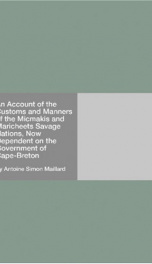An Account of the Customs and Manners of the Micmakis and Maricheets Savage Nations, Now Dependent on the Government of Cape-Breton

From the preface: For the better understanding of the letter immediately following, it may not be unnecessary to give the reader some previous idea of the people who are the subject of it, as well of the letter-writer. The best account of the Mickmakis I could find, and certainly the most authentic, is in a memorial furnished by the French ministry in April, 1751, from which the following paragraph is a translated extract: "The government of the savages dependent on Cape-Breton exacts a particular attention. All these savages go under the name of Mickmakis. Before the last war they could raise about six hundred fighting-men, according to an account given in to his most Christian majesty, and were distributed in several villages established on Cape-Breton island, island of St. John, on both the coasts of Acadia (Nova-Scotia) and on that of Canada. All, or most of the inhabitants of these villages have been instructed in the Christian religion, by missionaries which the king of France constantly maintains amongst them. It is customary to distribute every year to them presents, in the name of his majesty, which consist in arms, ammunition of war, victuals, cloathing, and utensils of various sorts. And these presents are regulated according to the circumstances of the time, and to the satisfaction that shall have been given to the government by the conduct of these savages. In the last war they behaved so as to deserve our approbation, and indeed have, on all occasions, given marks of their attachment and fidelity. Since the peace too, they have equally distinguished themselves in the disturbances that are on foot on the side of Acadia (Nova-Scotia)." The last part of this foregoing paragraph needs no comment. Every one knows by what sort of service these savages merit the encouragement of the French government, and by what acts of perfidy and cruelty exercised on the English, they are to earn their reward. The Maricheets, mentioned in the said letter form a distinct nation, chiefly settled at St. John's, and are often confounded with the Abenaquis, so as to pass for one nation with them, though there is certainly some distinction. They used, till lately, to be in a constant state of hostility with the Mickmakis. But, however, these nations may be at peace or variance with one another, in one point they agree, which is a thorough enmity to the English, cultivated, with great application by the missionaries, who add to the scandal of a conduct so contrary to their profession, the baseness of denying or evading the charge by the most pitiful equivocations. It is with the words peace, charity, and universal benevolence, for ever in their mouths, that these incendiaries, by instigations direct and indirect, inflame and excite the savages to commit the cruellest outrages of war, and the blackest acts of treachery. Poor Captain How! is well known to have paid with his life, infamously taken away by them, at a parley, the influence one of these missionaries (now a prisoner in the island of Jersey,) had over these misguided wretches, whose native innocence and simplicity are not proof against the corruption, and artful suggestions of those holy seducers. --This text refers to the Kindle Edition edition.
Info about the book
Author:
Series:
Unknown
ASIN:
B0084A60W0
Rating:
3/5 (3)Your rating:
0/5
Languge:
English
Users who have this book
Users who want this book
What readers are saying
What do you think? Write your own comment on this book!
write a commentif you like An Account of the Customs and Manners of the Micmakis and Maricheets Savage Nations, Now Dependent on the Government of Cape-Breton try:
Do you want to read a book that interests you? It’s EASY!
Create an account and send a request for reading to other users on the Webpage of the book!

